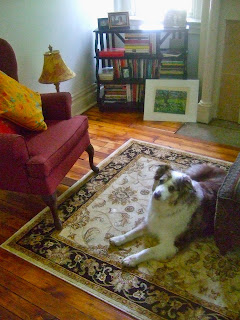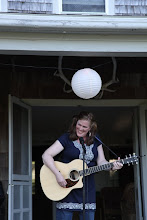I’m thinking a lot about
language lately, specifically about the sheer richness of words in the English
language, and about how much I love the color, vivacity, sound and texture of
each individual word. School is back in session, and my tenth grade students have
completed a list of 25 words (defining them) in preparation for their first
vocabulary quiz next week. Last Wednesday, before we embarked on our in-class
review of the definitions, I gave the students my I-love-words speech:
“Aren’t we lucky to have so many words that can refine,
shade, and precisely communicate exactly the things we want to express?” I
exclaim, as I open my word list on the computer. “For instance, I don’t want to
just say I’m “happy;” I want to say I’m ecstatic,
exhilarated, rhapsodic! And our
language allows us each new dimension.”
I’m practically singing at them and grin foolishly: “Do you see how each
one of those words amps up the volume on merely “happy”?
My students stare at me, slightly skeptical, mildly bemused.
My students stare at me, slightly skeptical, mildly bemused.
“Listen to the sounds of some of these words. If you had
not defined them yet, and somebody had called you “unctuous” or “overweening”
or “gauche,” would you think that person was complimenting you?”
A girl in the front row states matter-of-factly, “Of course not.”
“And why not?”
“Because they sound
bad. “unc” isn’t a very nice sound.
And if you’re “over,” it’s usually not good…”
I nod in agreement, though I caution, “It’s not always
the case that the sound of the word signals the connotation of the word. But it
is fun to pay attention to how a word
sounds as well as to how it’s spelled
and defined.”
**********
Today, in school, a colleague is talking about learning a
second language. As she speaks, my mind trips into memory. I am eight years
old, visiting my beloved Grandparents, Maurice and Florence Roche, on 88th
Street in Jackson Heights, New York. My sisters and I, along with our cousin
Katie, stay with my mother’s parents for a week each summer. And our special
week has come around again!
Visiting Grandma and
Grandpa in Jackson Heights comes with its own set of rules, but I love these
rules, partly because they draw a demarcation between my boring, everyday life
in the suburbs of Colonia, NJ an exciting, surprising life in New York
City. One of the rules is that we girls have to wear our Sunday best for the entire week, when
visiting Grandma and Grandpa. We're not allowed to wear
blue jeans, T-shirts, sneakers, or shorts. We wear summer dresses and frilly
white anklets and patent leather shoes. Sometimes, we even wear white gloves. We are in the Big City now, and we dress the part.
 |
| Grandpa and Grandma Roche |
My grandparents, who both grew up in Manhattan, never learned to drive a car, so we walk everywhere, or we ride in one of those big old
black and yellow checkered cabs. On some summer evenings, we walk the city
blocks to one of my Grandparents’ favorite restaurants, the Continental or the Cavalier, where a piano player croons
songs from the 1930’s and 40’s (and sometimes we join in singing!), and the waiters and waitresses all know and
cater affectionately to Maurice and Florence Roche. This particular summer, as we stroll our way up 88th
street in our finery, and turn onto the more crowded sidewalks, where pedestrians hasten swiftly past, I decide to walk ahead of my
sisters, my Grandparents, and my cousin Katie. At eight, I am the youngest of the group. And perhaps it is the giddiness of being in the Big Apple again for the week or the fact that I wearing pretty clothes and hats and shoes. Or perhaps it is my secret joy at once more being in a city where I can hear Spanish-speaking men and women rapid fire their beautiful syllables into the
air around me, on subways and in grocery stores. (As a girl, I am drawn to
people who speak Spanish. Part of the fascination is that I am excluded from
their communication. I imagine their syllables, as they flow from a speaker’s mouth, dancing around my head like the notes in Disney’s Fantasia. ) Whatever the reason, all I know is that I want to
continue my transformation this week and hold onto this exhilarating sense of being able
to be someone else for a while.
So, as we walk the city blocks toward the restaurant, I
suddenly want the approaching strangers on the sidewalk to think that I am a foreign child, a girl who is special and glamorously different
from her American counterparts. Of course, the challenge is that English is the
only language I know—and American English with a Jersey accent is not exactly pretty (though, to some, those dropped r’s and words like dawg may appear foreign!) But in my happy dazzle of being back in
New York and with summer in full leaf along the walks, I don’t let the fact
that I’m not bilingual stop me.
 |
| Grandpa Roche |
I walk proudly, a few feet ahead of
my family, fiddling with the clasp on my patent leather purse, and I speak
louder than normal in a convincing (or so I imagine) stream of gibberish, as if
I am answering a question that my sister had posed moments
before. Of course, I do not turn to look
at my sisters’ reactions to my foreign language, because I can already hear
their disapproval and giggling behind me, “Sharon, what are you doing? Stop
it!” They try to coax me back to walk with the group, where they might exercise control over my cheerful prattling of nonsense syllables. “No,”
I say, “they (I nod at the strangers walking by) think I’m from Europe!”
I’m having fun, though in my own mind, I have not decided
what nationality I want to be mistaken for, nor do I know enough accents to
even try to imitate one well. On and on, I speak
my gibberish, its mélange of mixed-up nouns, verbs, and parsed
conjugations littered throughout, and I blunder from “accent” to “accent:" a sort
of French, a kind of German, a hint of Spanish.
I’m sure, those within true earshot, if they bother to tune into me at all,
probably pity the poor confused girl, who cannot speak correctly, walking by in
her pretty party dress. But in my own mind, I am exotic, original, a girl with new words at her disposal. And new words mean new stories to tell. A new me with
new secrets. And if a single person, passing by, pauses, even for a split
second to look my way, I feel validated. “See!” I sing out. “They know I’m not
from here!”
(“That’s for sure!” my sisters retort in unison.)
On the streets of Jackson Heights, I am aware enough to
know that language is power. And, in
my mind, as I walk the streets of Queens, New York, grounded by my loving
family, feeling grown up in my ivory dress with its hem of rainbow colors, I can also soar and take
a chance to see where wrapping myself in a “new language” might take me (if
only in my imagination.) (“That’s for sure!” my sisters retort in unison.)
 |
| Grandpa and Grandma with the 12 Fagan children in NYC |
 |
| Grandma and Grandpa Roch on their 50th Wedding Anniversary |
 |
| Sharon Reading to brother Terry |
tongue" elevated me from just a third-grader at St. John Vianney School, to a lass, who housed a world perspective and who could reveal her stories in a stream of music.I was naming my own bright landscape and carving out my own words beneath the streetlights' glow on 88th street and its sturdy, beloved rows of brownstones.
August 31. 2013















